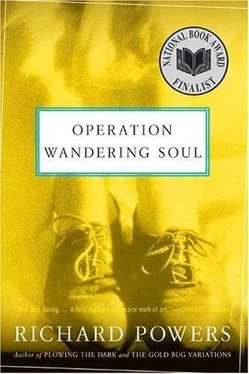Richard Powers - Operation Wandering Soul
Здесь есть возможность читать онлайн «Richard Powers - Operation Wandering Soul» весь текст электронной книги совершенно бесплатно (целиком полную версию без сокращений). В некоторых случаях можно слушать аудио, скачать через торрент в формате fb2 и присутствует краткое содержание. Год выпуска: 2002, Издательство: Harper Perennial, Жанр: Современная проза, на английском языке. Описание произведения, (предисловие) а так же отзывы посетителей доступны на портале библиотеки ЛибКат.
- Название:Operation Wandering Soul
- Автор:
- Издательство:Harper Perennial
- Жанр:
- Год:2002
- ISBN:нет данных
- Рейтинг книги:5 / 5. Голосов: 1
-
Избранное:Добавить в избранное
- Отзывы:
-
Ваша оценка:
- 100
- 1
- 2
- 3
- 4
- 5
Operation Wandering Soul: краткое содержание, описание и аннотация
Предлагаем к чтению аннотацию, описание, краткое содержание или предисловие (зависит от того, что написал сам автор книги «Operation Wandering Soul»). Если вы не нашли необходимую информацию о книге — напишите в комментариях, мы постараемся отыскать её.
Operation Wandering Soul — читать онлайн бесплатно полную книгу (весь текст) целиком
Ниже представлен текст книги, разбитый по страницам. Система сохранения места последней прочитанной страницы, позволяет с удобством читать онлайн бесплатно книгу «Operation Wandering Soul», без необходимости каждый раз заново искать на чём Вы остановились. Поставьте закладку, и сможете в любой момент перейти на страницу, на которой закончили чтение.
Интервал:
Закладка:
For one highly cultivated, multinational confederation the size of Western Europe, these years truly were the end of history. Pizarro and his two hundred soldiers sprung their ambush in Cajamarca town square, captured the Incan emperor, and slaughtered his four-thou-sand-man bodyguard. The Cuzco hegemony fell, and an empire as remarkable as any the world has seen vanished into legend.
From the home ports, a fabulous, golden land seemed to rise up from the sea in the nick of time expressly to solve intractable overpopulation, inflation, stagnation, unemployment, and restless violence. Yet the overnight infusion of new goods — tobacco, tubers, maize, gold, human lives — only increased the disruption of populations. By 1527, all Europe was crisscrossing the seas in carracks and caravels. Assembling a fleet became a nation's rite of passage, a frenzied, peripatetic hunt for commodities and resources. But by a process that has become historical law, a sudden, often inflationary increase in the material stakes brought about a proportional expansion in the risk of disastrous…
(A passage obscured here by vigorous Crayola spirals, scarlet, canary-yellow, Adriatic blue-green.)
… had angered Charles with the Cognac maneuverings. The emperor's response was to incite a force of mercenaries under Frunds-berg. We are fortunate to possess, almost intact, the diary of Michael Klotz, a Lutheran lance commander in the condottiere's band, a remarkable document providing, like Cellini's on the other side, a firsthand account of the Sack. Klotz writes of the devastation the Landsknechte cut on the way through Lombardy, where they merged with the duke of Bourbon's army for a combined drive down the Via Emilia upon the Eternal City.
Privately, Klotz favored the last-minute attempts to patch up a truce between pope and emperor. But the terms offered by Clement and accepted by Charles's agent were too niggling for the twenty thousand German and Spanish troops, stoked by promises of pillage and booty. Klotz could no more sway his own brigade than Frunds-berg or Bourbon could restrain the force as a whole. The army now advanced on the capital of Christendom with an independent will.
By April, Rome at last realized that it was the object of the march. On Easter, a crazed recluse ran through the streets, calling on the bastard children of Sodom to repent or be destroyed. Desperate defense preparations commenced, but these came too late. The pope's guard were outnumbered at least five to one. Skillful use of the walls and existing artillery managed to thin the attacking squares. Soon, however, the pope was forced back upon the Castel Sant'Angelo. Cellini tells us how he single-handedly…
(Two more pages of florid Crayola, now a jeweled, sunken garden through which float disembodied figurines, boats, fireworks, and several uppercase Hs and Os, alongside a chorus line of amorphous shepherd's crooks.)
The task of safeguarding the endless inventories of artistic splendor in the papal treasuries fell to the younger Antonio da Sangallo. Antonio, nephew of the great Sangallo architect brothers, then headed the building project whose funding schemes — excessive taxations, selling of papal indulgences, and the like — had precipitated the calamitous unraveling of the Western world…
Many of the treasury objects were melted down rather than allowed to fall into the hands of the Northern invaders. Cellini himself (who derided Antonio as a tasteless woodworker) personally destroyed unique masterworks of his own art, as well as works by his greatest contemporaries and predecessors.
But Sangallo had another plan, equally outlandish, one that meant to preserve the achievements of civilization from the storm. The shape of the secret measures emerges only from gaps in the record. The master builder worked around the clock in the confines of the Vatican, packing sandbags to fill Sixtus's private chapel, hoping to protect the Botticelli, Perugino, and Ghirlandajo frescoes from falling mortar and to absorb the bombardment's shocks to Michelangelo's already world-famous tabernacle to Creation. Antonio worked steadily and without much hope to preserve the triumphs of the imagination from reality's latest onslaught, stacking sand in the full knowledge that this was neither the first, nor the last, nor even the most senseless of polities' annihilating sieges.
Antonio's daring plan was carried out on the night of May 6, as the invaders poured through the breached walls in a turmoil of fog and artillery fire. He assembled, in the now-barricaded papal apartments, as many of the quarter's juvenile homeless as he could find. Street urchins were the ideal cover, the last bodies that a pillaging mercenary would think to shake down. On his own initiative, Sangallo doled out priceless medallions, cameos, portraits, reliquaries, vessels, precious glass, and jewelry to this band of cutthroat children, instructing them to carry the fortunes away and threatening them with God's eternal damnation if they should fail to return so little as a single piece of sacred art after the danger subsided.
And so it came about that a considerable part of the richest collection of artifacts in Europe passed into the impoverished streets inside the torn shirt seams of children, not one of them privileged enough ever to have attended school…
Klotz relates, with fascinated horror, the events of those eight days. His professional soldiers degenerated into a blood-drinking mob, killing at random for sheer pleasure, ransacking churches and libraries and palazzi, destroying the university, starting fires with irreplaceable manuscripts, looting anything that looked pawnable, carrying off all movable painted surfaces and destroying much of the immovable out of spite, torturing eminences, parading about in cardinals' vestments, desecrating altars, proclaiming Luther the pope, forcing nuns and young women and girls into the Piazza del Popolo at sword point for a promiscuous carnival of violation.
(The word "promiscuous" clumsily circled by crude exclamation points.) In one senseless indulgence, marauders entered the orphanage of Santo Spirito Hospital and slaughtered all the helpless who had assumed sanctuary there. The pope was held prisoner in the Castello; law and decency had come to an end. It is little wonder that the Sage of Rotterdam saw in the Sack "not the destruction of a single city, but of the entire world."
Klotz's share of the spoils, if we credit his account, was modest. He spent the first two days attempting to restore decorum. As papal resistance dissolved, he roamed the streets trying to reduce the brutality of his men. He writes at length about rescuing a tiny boy and girl from the hands of a loot-incensed cavalier. The soldier had discovered brooches in the children's possession — an encrusted filigree pin, a Romanesque silver winged grotesque, and a Florentine terra-cotta. Klotz killed the molesting soldier with some evident satisfaction.
There follows a long, sometimes pathetic passage in which Klotz describes taking the children under his private protection during the fierce, waning days of the Sack. His harrowing inner battle between the altruistic impulse to protect these wartime refugees, followed by what seem to have been repeated, ungovernable bouts of baser…
(Two pages cleanly excised by razor blade or moral equivalent)
… upon Klotz's return to Germany and his rise through the ranks of the imperial armies. Eight years after the Sack of Rome he was involved in another siege. This time, he was deployed against the Catholic capital's very opposite: the Anabaptist stronghold of Münster, the protestant New Jerusalem.
The Anabaptist movement, a loose uprising of millennial sects, gained momentum in Germany and the Low Countries during the troubled late 1520s and early 1530s. Hans Hut, a bookbinder turned prophet, died mysteriously in an Augsburg prison in 1527, having prophesied Christ's return for the following year. The wandering visionary Melchior Hofmann gathered a wide following, preaching a period of woes that would culminate in revelation in 1533. And in that year, mass expectation of the End began to turn the prosperous Hanse town of Münster into a grotesque parody of the City of God on Earth.
Читать дальшеИнтервал:
Закладка:
Похожие книги на «Operation Wandering Soul»
Представляем Вашему вниманию похожие книги на «Operation Wandering Soul» списком для выбора. Мы отобрали схожую по названию и смыслу литературу в надежде предоставить читателям больше вариантов отыскать новые, интересные, ещё непрочитанные произведения.
Обсуждение, отзывы о книге «Operation Wandering Soul» и просто собственные мнения читателей. Оставьте ваши комментарии, напишите, что Вы думаете о произведении, его смысле или главных героях. Укажите что конкретно понравилось, а что нет, и почему Вы так считаете.












